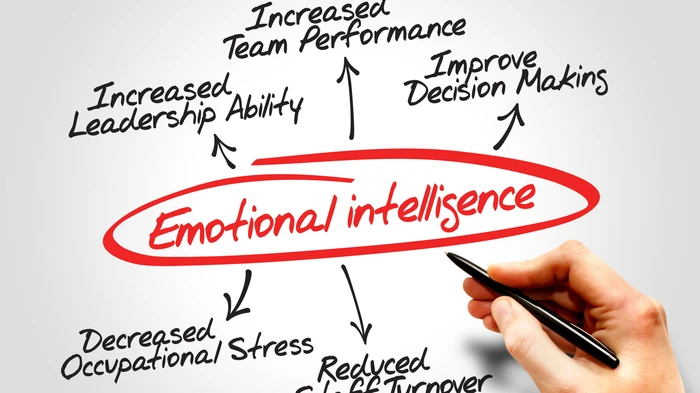More Than a Feeling: Emotional Intelligence in the workplace
Emotional Intelligence is an important part of leadership and self-management. We provide some resources to help you develop this skill.

A recent meeting between two high profile international leaders was minutely analysed in the world media. Politics aside, one of the biggest contrasts between the personal styles of the two men was their differing levels of emotional intelligence.
But what is "emotional intelligence” (more often shortened to EI or EQ) and why is it necessary? Is it something you have or is it, like many leadership and interpersonal personal skills, something you can develop? If so, how do you "work on it"?
Psychology Today says :
Emotional intelligence refers to the ability to identify and manage one’s own emotions, as well as the emotions of others. Emotional intelligence is generally said to include a few skills: namely emotional awareness, or the ability to identify and name one’s own emotions; the ability to harness those emotions and apply them to tasks like thinking and problem solving; and the ability to manage emotions, which includes both regulating one’s own emotions when necessary and helping others to do the same.
As a theory, the concept of emotional intelligence was developed in the 1990s, however it was the publication of Daniel Goleman’s book Emotional Intelligence that brought the importance of EI to the attention of the wider public, particularly the business world.
Some years later, Emotional Intelligence was named one of the 25 Most Influential Business Management Books by TIME Magazine and 25 years on, Goleman’s best selling work is still referenced.
In this TED talk, Goleman outlines strategies to become more emotionally intelligent.

To help you on your EQ/EI journey we've collated some resources for you.
Articles:
- 5 things emotionally intelligent managers do differently
"... leaders with a high level of emotional intelligence are essential to a company’s success". - 3 signs you need to improve your emotional intelligence
"When you lack emotional intelligence, other people often do not want to work with you, to engage with your projects, or to go the extra mile to help you succeed". - Developing Emotional Intelligence As A Leader
This article outlines "... ways of developing emotional intelligence as a leader based on the four elements in Daniel Goleman’s original research: Self-Awareness, Self-Regulation, Empathy, and Social Skill". - Why emotional intelligence is important in leadership
"Leaders set the tone of their organization. If they lack emotional intelligence, it could have more far-reaching consequences, resulting in lower employee engagement and a higher turnover rate". - Seven Traits Of An Emotionally Intelligent Leader
"... [EI is] ... no longer just a nice-to-have skill, but one of the World Economic Forum’s Top Ten skills to thrive in the fourth industrial revolution (and it arguably underpins the other nine)". - 5 ways to display emotional intelligence (even if it’s not your strong suit)
Science-based lessons to help you boost your EQ.
Online courses via Linkedin Learning (freely available with Library membership):
- Developing Your Emotional Intelligence
Executive coach and organizational psychologist Gemma Roberts explains what emotional intelligence (EI) is and why it's important. She helps you become more self-aware so that you can identify triggers that may hijack your performance. Gemma also helps you align your intentions and your impact so that you can build strong and collaborative relationships. - Communicating with Emotional Intelligence
In this course, Brenda Bailey-Hughes defines exactly what emotional intelligence is and how it can help you manage your emotions and build stronger relationships. Learn how to understand others’ perspectives, balance empathy and accountability, demonstrate listening, and respond appropriately to a variety of verbal and nonverbal cues. Using these simple techniques, you can quickly improve your communication and make conversations at work and home more productive and satisfying. - Leading with Emotional Intelligence
Britt Andreatta shares how to boost your emotional quotient (EQ) to better lead teams, work with peers, and manage up. Learn what emotional intelligence is and how it factors in at work, and discover concrete techniques for raising your own EQ. This includes perceiving yourself accurately, exercising emotional self-control, understanding and managing your triggers, and developing empathy. Then, turn those lessons around to build your awareness of others and become a more inspiring—and effective—leader.
From the book collection:
- Emotional intelligence : a simple and actionable guide to increasing performance, engagement and ownership (2021) by Amy Jacobson
- The emotionally intelligent workplace : how to select for, measure, and improve emotional intelligence in individuals, groups, and organizations (2001)
- Emotional intelligence : why it can matter more than IQ (2020) by Daniel Goleman Also available as EBook
- EQ applied : the real-world guide to emotional intelligence : how to make emotions work for you, instead of against you (2019) by Justin Bariso. eAudiobook
If you need more information, please contact the Prosearch team at the library. We can help you find information across a range of perspectives and resources. All enquiries are treated in confidence.